2016年-新课标英语全国卷III
2016年高考全国3卷英语试题及答案解析
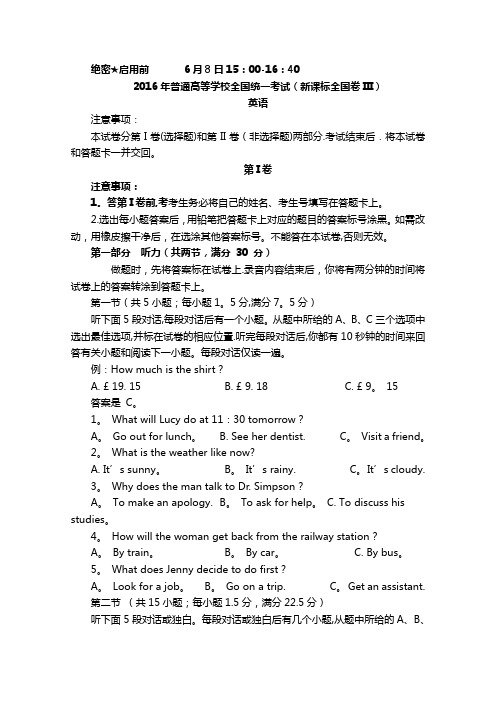
绝密★启用前6月8日15:00-16:402016年普通高等学校全国统一考试(新课标全国卷III)英语注意事项:本试卷分第I卷(选择题)和第II卷(非选择题)两部分.考试结束后.将本试卷和答题卡一并交回。
第I卷注意事项:1。
答第I卷前,考考生务必将自己的姓名、考生号填写在答题卡上。
2.选出每小题答案后,用铅笔把答题卡上对应的题目的答案标号涂黑。
如需改动,用橡皮擦干净后,在选涂其他答案标号。
不能答在本试卷,否则无效。
第一部分听力(共两节,满分30 分)做题时,先将答案标在试卷上.录音内容结束后,你将有两分钟的时间将试卷上的答案转涂到答题卡上。
第一节(共5小题;每小题1。
5分,满分7。
5分)听下面5段对话,每段对话后有一个小题。
从题中所给的A、B、C三个选项中选出最佳选项,并标在试卷的相应位置.听完每段对话后,你都有10秒钟的时间来回答有关小题和阅读下一小题。
每段对话仅读一遍。
例:How much is the shirt?A. £ 19. 15B. £ 9. 18C. £ 9。
15答案是C。
1。
What will Lucy do at 11:30 tomorrow?A。
Go out for lunch。
B. See her dentist. C。
Visit a friend。
2。
What is the weather like now?A. It’s sunny。
B。
It’s rainy.C。
It’s cloudy.3。
Why does the man talk to Dr. Simpson?A。
To make an apology. B。
To ask for help。
C. To discuss his studies。
4。
How will the woman get back from the railway station?A。
By train。
B。
By car。
2016年高考全国3卷英语试题(含答案)
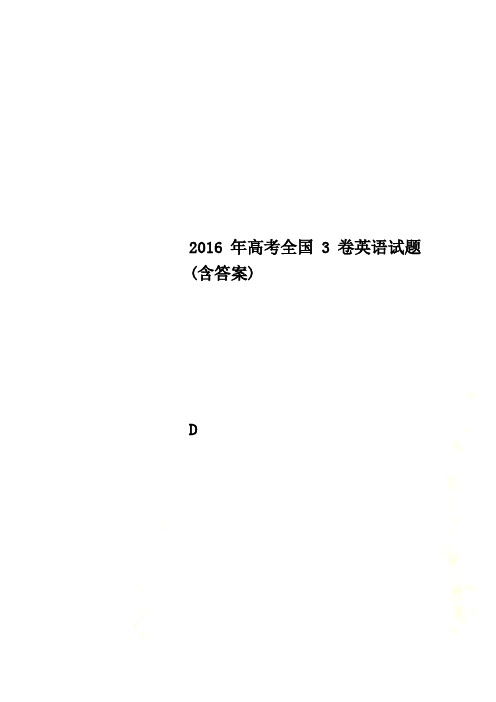
2016年高考全国3卷英语试题(含答案)DA. It’s sunny.B. It’s rainy.C. It’s cloudy.3. Why does the man talk to Dr. Simpson?A. To make an apology.B. To ask for help.C. To discuss his studies.4. How will the woman get back from the railway station?A. By train.B. By car.C. By bus.5. What does Jenny decide to do first?A. Look for a job.B. Go on a trip.C. Get an assistant.第二节(共15小题;每小题1.5分,满分22.5分)听下面5段对话或独白。
每段对话或独白后有几个小题,从题中所给的A、B、C三个选项中选出最佳选项,并标在试卷的相应位置。
听每段对话或独白前,你将有时间阅读各个小题,每小题5秒钟;听完后,各小题将给出5秒钟的作答时间。
每段对话或独白读两遍。
听第6段材料,回答第6、7题。
6. What time is it now?A. 1:45.B. 2:10.C. 2:15.7. What will the man do?A. Work on a project.B. See Linda in the library.C. Meet with Professor Smith.听第7段材料,回答第8至10题。
8. What are the speakers talking about?A Having guests this weekend.B. Going out for sightseeing.C. Moving into a new house.9. What is the relationship between the speakers?A. Neighbors.B. Husband and wife.C. Host and visitor.10. What will the man do tomorrow?A. Work in his garden.B. Have a barbecue.C. Do some shopping.听第8段材料,回答第11至13题。
2016年高考全国3卷英语试题及答案解析

绝密★启用前6月8日15:00—16:402016年普通高等学校全国统一考试(新课标全国卷III)英语注意事项:本试卷分第I卷(选择题)和第II卷(非选择题)两部分。
考试结束后.将本试卷和答题卡一并交回。
第I卷注意事项:1。
答第I卷前,考考生务必将自己的姓名、考生号填写在答题卡上.2.选出每小题答案后,用铅笔把答题卡上对应的题目的答案标号涂黑。
如需改动,用橡皮擦干净后,在选涂其他答案标号。
不能答在本试卷,否则无效.第一部分听力(共两节,满分30 分)做题时,先将答案标在试卷上。
录音内容结束后,你将有两分钟的时间将试卷上的答案转涂到答题卡上。
第一节(共5小题;每小题1。
5分,满分7.5分)听下面5段对话,每段对话后有一个小题。
从题中所给的A、B、C三个选项中选出最佳选项,并标在试卷的相应位置。
听完每段对话后,你都有10秒钟的时间来回答有关小题和阅读下一小题。
每段对话仅读一遍。
例:How much is the shirt?A。
£ 19。
15 B。
£ 9。
18 C。
£ 9。
15答案是C。
1。
What will Lucy do at 11:30 tomorrow?A. Go out for lunch. B。
See her dentist。
C。
Visit a friend.2. What is the weather like now?A。
It’s sunny. B. It’s rainy。
C. It's cloudy。
3. Why does the man talk to Dr. Simpson?A. To make an apology. B。
To ask for help。
C。
To discuss his studies。
4. How will the woman get back from the railway station?A. By train. B。
2016年高考全国3卷英语试题及答案解析

绝密★启用前6月8日15:00-16:402016年普通高等学校全国统一考试(新课标全国卷III)英语注意事项:本试卷分第I卷(选择题)和第II卷(非选择题)两部分.考试结束后.将本试卷和答题卡一并交回。
第I卷注意事项:1。
答第I卷前,考考生务必将自己的姓名、考生号填写在答题卡上.2.选出每小题答案后,用铅笔把答题卡上对应的题目的答案标号涂黑.如需改动,用橡皮擦干净后,在选涂其他答案标号。
不能答在本试卷,否则无效。
第一部分听力(共两节,满分30 分)做题时,先将答案标在试卷上。
录音内容结束后,你将有两分钟的时间将试卷上的答案转涂到答题卡上。
第一节(共5小题;每小题1.5分,满分7。
5分)听下面5段对话,每段对话后有一个小题。
从题中所给的A、B、C三个选项中选出最佳选项,并标在试卷的相应位置。
听完每段对话后,你都有10秒钟的时间来回答有关小题和阅读下一小题.每段对话仅读一遍。
例:How much is the shirt?A. £ 19。
15B. £ 9. 18C. £ 9。
15答案是C。
1。
What will Lucy do at 11:30 tomorrow?A. Go out for lunch.B. See her dentist。
C。
Visit a friend。
2。
What is the weather like now?A. It’s sunny.B. It’s rainy.C。
It’s cloudy。
3。
Why does the man talk to Dr。
Simpson?A。
To make an apology. B. To ask for help. C. To discuss his studies.4. How will the woman get back from the railway station?A. By train。
B. By car. C。
2016年高考英语全国卷3含答案
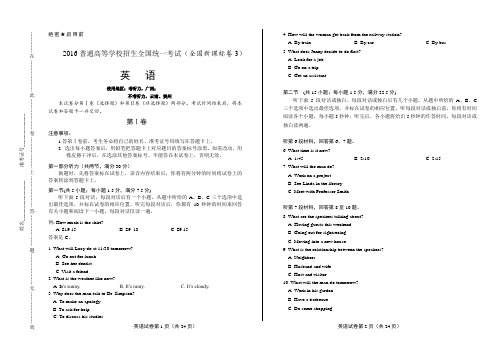
英语试卷第1页(共24页)英语试卷第2页(共24页)绝密★启用前 2016普通高等学校招生全国统一考试(全国新课标卷3)英语使用地区:考听力,广西;不考听力,云南、贵州本试卷分第Ⅰ卷(选择题)和第Ⅱ卷(非选择题)两部分。
考试时间结束后,将本试卷和答题卡一并交回。
第Ⅰ卷注意事项:1.答第Ⅰ卷前,考生务必将自己的姓名、准考证号码填写在答题卡上。
2. 选出每小题答案后,用铅笔把答题卡上对应题目的答案标号涂黑。
如需改动,用橡皮擦干净后,在选涂其他答案标号。
不能答在本试卷上,否则无效。
第一部分听力(共两节,满分30分)做题时,先将答案标在试卷上,录音内容结束后,你将有两分钟的时间将试卷上的答案转涂到答题卡上。
第一节(共5小题;每小题1.5分,满分7.5分)听下面5段对话。
每段对话后有一个小题,从题中所给的A 、B 、C 三个选项中选出最佳选项,并标在试卷的相应位置。
听完每段对话后,你都有10秒钟的时间来回答有关小题和阅读下一小题。
每段对话仅读一遍。
例: How much is the shirt? A. £19.15. B. £9. 18. C. £9.15.答案是C 。
1. What will Lucy do at 11:30 tomorrow?A. Go out for lunch.B. See her dentist.C. Visit a friend.2. What is the weather like now? A. It ’s sunny. B. It’s rainy.C. It’s cloudy.3. Why does the man talk to Dr. Simpson? A. To make an apology. B. To ask for help.C. To discuss his studies.4. How will the woman get back from the railway station? A. By train.B. By car.C. By bus.5. What does Jenny decide to do first? A. Look for a job. B. Go on a trip. C. Get an assistant.第二节 (共15小题;每小题1.5分,满分22.5分)听下面5段对话或独白。
2016年高考英语全国Ⅲ卷试题及答案
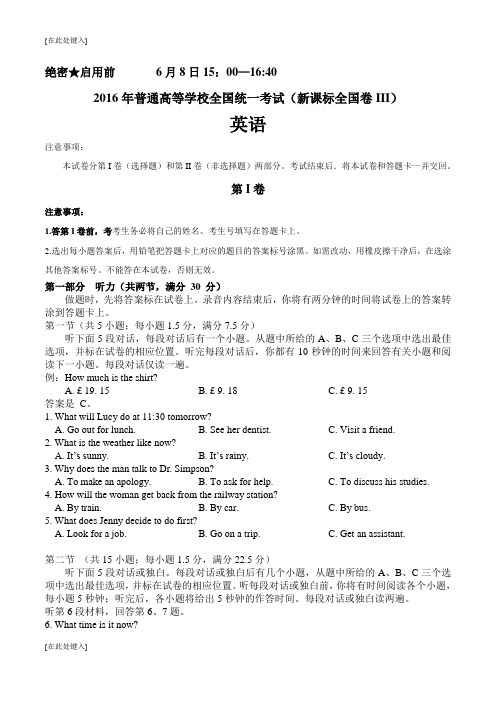
绝密★启用前6月8日15:00—16:402016年普通高等学校全国统一考试(新课标全国卷III)英语注意事项:本试卷分第I卷(选择题)和第II卷(非选择题)两部分。
考试结束后.将本试卷和答题卡一并交回。
第I卷注意事项:1.答第I卷前,考考生务必将自己的姓名、考生号填写在答题卡上。
2.选出每小题答案后,用铅笔把答题卡上对应的题目的答案标号涂黑。
如需改动,用橡皮擦干净后,在选涂其他答案标号。
不能答在本试卷,否则无效。
第一部分听力(共两节,满分30 分)做题时,先将答案标在试卷上。
录音内容结束后,你将有两分钟的时间将试卷上的答案转涂到答题卡上。
第一节(共5小题;每小题1.5分,满分7.5分)听下面5段对话,每段对话后有一个小题。
从题中所给的A、B、C三个选项中选出最佳选项,并标在试卷的相应位置。
听完每段对话后,你都有10秒钟的时间来回答有关小题和阅读下一小题。
每段对话仅读一遍。
例:How much is the shirt?A. £ 19. 15B. £ 9. 18C. £ 9. 15答案是C。
1. What will Lucy do at 11:30 tomorrow?A. Go out for lunch.B. See her dentist.C. Visit a friend.2. What is the weather like now?A. It’s sunny.B. It’s rainy.C. It’s cloudy.3. Why does the man talk to Dr. Simpson?A. To make an apology.B. To ask for help.C. To discuss his studies.4. How will the woman get back from the railway station?A. By train.B. By car.C. By bus.5. What does Jenny decide to do first?A. Look for a job.B. Go on a trip.C. Get an assistant.第二节(共15小题;每小题1.5分,满分22.5分)听下面5段对话或独白。
2016年-新课标英语全国卷3
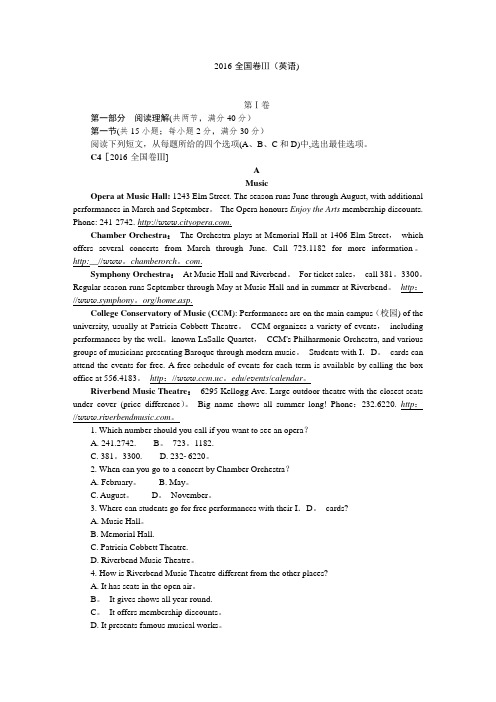
2016·全国卷Ⅲ(英语)第Ⅰ卷第一部分阅读理解(共两节,满分40分)第一节(共15小题;每小题2分,满分30分)阅读下列短文,从每题所给的四个选项(A、B、C和D)中,选出最佳选项。
C4[2016·全国卷Ⅲ]AMusicOpera at Music Hall: 1243 Elm Street. The season runs June through August, with additional performances in March and September。
The Opera honours Enjoy the Arts membership discounts. Phone: 241-2742. .Chamber Orchestra:The Orchestra plays at Memorial Hall at 1406 Elm Street,which offers several concerts from March through June. Call 723.1182 for more information。
http:__//www。
chamberorch。
com.Symphony Orchestra:At Music Hall and Riverbend。
For ticket sales,call 381。
3300。
Regular season runs September through May at Music Hall and in summer at Riverbend。
http://www.symphony。
org/home.asp.College Conservatory of Music (CCM): Performances are on the main campus(校园) of the university, usually at Patricia Cobbett Theatre。
2016年高考全国3卷英语试题及答案解析
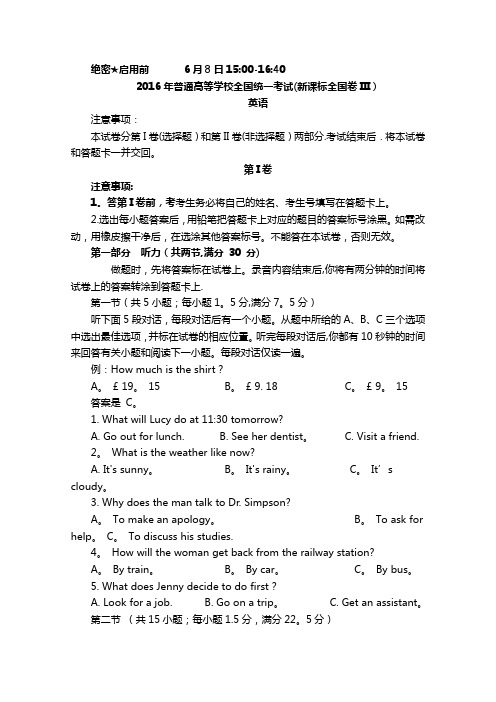
绝密★启用前6月8日15:00-16:402016年普通高等学校全国统一考试(新课标全国卷III)英语注意事项:本试卷分第I卷(选择题)和第II卷(非选择题)两部分.考试结束后.将本试卷和答题卡一并交回。
第I卷注意事项:1。
答第I卷前,考考生务必将自己的姓名、考生号填写在答题卡上。
2.选出每小题答案后,用铅笔把答题卡上对应的题目的答案标号涂黑。
如需改动,用橡皮擦干净后,在选涂其他答案标号。
不能答在本试卷,否则无效。
第一部分听力(共两节,满分30 分)做题时,先将答案标在试卷上。
录音内容结束后,你将有两分钟的时间将试卷上的答案转涂到答题卡上.第一节(共5小题;每小题1。
5分,满分7。
5分)听下面5段对话,每段对话后有一个小题。
从题中所给的A、B、C三个选项中选出最佳选项,并标在试卷的相应位置。
听完每段对话后,你都有10秒钟的时间来回答有关小题和阅读下一小题。
每段对话仅读一遍。
例:How much is the shirt?A。
£ 19。
15 B。
£ 9. 18C。
£ 9。
15答案是C。
1. What will Lucy do at 11:30 tomorrow?A. Go out for lunch.B. See her dentist。
C. Visit a friend.2。
What is the weather like now?A. It's sunny。
B。
It's rainy。
C。
It’s cloudy。
3. Why does the man talk to Dr. Simpson?A。
To make an apology。
B。
To ask for help。
C。
To discuss his studies.4。
How will the woman get back from the railway station?A。
By train。
B。
2016年高考英语全国卷3(含详细答案)
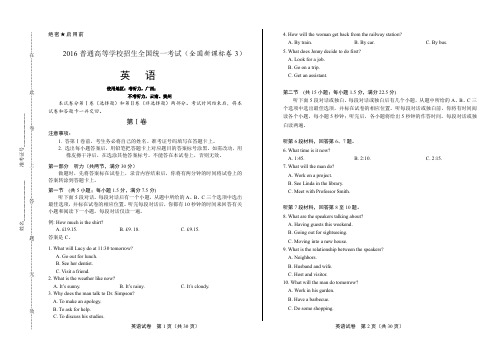
英语试卷 第1页(共30页)英语试卷 第2页(共30页)绝密★启用前 2016普通高等学校招生全国统一考试(全国新课标卷3)英语使用地区:考听力,广西;不考听力,云南、贵州本试卷分第Ⅰ卷(选择题)和第Ⅱ卷(非选择题)两部分。
考试时间结束后,将本试卷和答题卡一并交回。
第Ⅰ卷注意事项:1. 答第Ⅰ卷前,考生务必将自己的姓名、准考证号码填写在答题卡上。
2. 选出每小题答案后,用铅笔把答题卡上对应题目的答案标号涂黑。
如需改动,用橡皮擦干净后,在选涂其他答案标号。
不能答在本试卷上,否则无效。
第一部分 听力(共两节,满分30分)做题时,先将答案标在试卷上,录音内容结束后,你将有两分钟的时间将试卷上的答案转涂到答题卡上。
第一节 (共5小题;每小题1.5分,满分7.5分)听下面5段对话。
每段对话后有一个小题,从题中所给的A 、B 、C 三个选项中选出最佳选项,并标在试卷的相应位置。
听完每段对话后,你都有10秒钟的时间来回答有关小题和阅读下一小题。
每段对话仅读一遍。
例: How much is the shirt? A. £19.15. B. £9. 18. C. £9.15.答案是C 。
1. What will Lucy do at 11:30 tomorrow?A. Go out for lunch.B. See her dentist.C. Visit a friend.2. What is the weather like now? A. It’s sunny. B. It’s rainy.C. It’s cloudy.3. Why does the man talk to Dr. Simpson? A. To make an apology. B. To ask for help.C. To discuss his studies.4. How will the woman get back from the railway station? A. By train.B. By car.C. By bus.5. What does Jenny decide to do first? A. Look for a job. B. Go on a trip. C. Get an assistant.第二节 (共15小题;每小题1.5分,满分22.5分)听下面5段对话或独白。
2016全国卷3高考试题及答案-英语
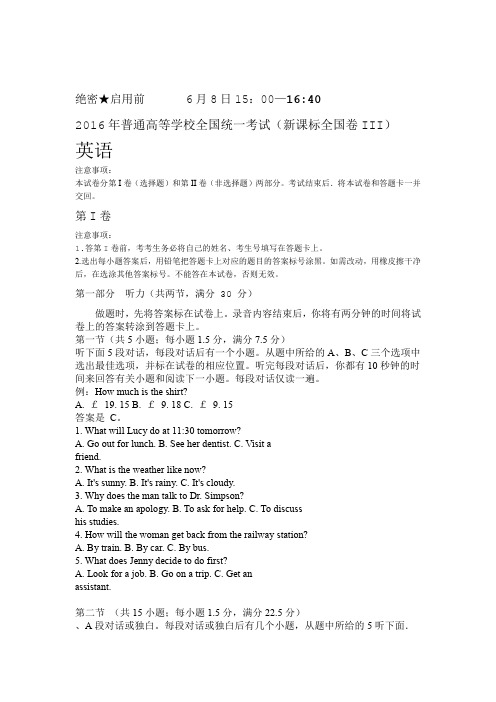
绝密★启用前 6月8日15:00—16:402016年普通高等学校全国统一考试(新课标全国卷III)英语注意事项:本试卷分第I卷(选择题)和第II卷(非选择题)两部分。
考试结束后.将本试卷和答题卡一并交回。
第I卷注意事项:1.答第I卷前,考考生务必将自己的姓名、考生号填写在答题卡上。
2.选出每小题答案后,用铅笔把答题卡上对应的题目的答案标号涂黑。
如需改动,用橡皮擦干净后,在选涂其他答案标号。
不能答在本试卷,否则无效。
第一部分听力(共两节,满分 30 分)做题时,先将答案标在试卷上。
录音内容结束后,你将有两分钟的时间将试卷上的答案转涂到答题卡上。
第一节(共5小题;每小题1.5分,满分7.5分)听下面5段对话,每段对话后有一个小题。
从题中所给的A、B、C三个选项中选出最佳选项,并标在试卷的相应位置。
听完每段对话后,你都有10秒钟的时间来回答有关小题和阅读下一小题。
每段对话仅读一遍。
例:How much is the shirt?A. £19. 15B. £9. 18C. £9. 15答案是C。
1. What will Lucy do at 11:30 tomorrow?A. Go out for lunch.B. See her dentist.C. Visit afriend.2. What is the weather like now?A. It's sunny.B. It's rainy.C. It's cloudy.3. Why does the man talk to Dr. Simpson?A. To make an apology.B. To ask for help.C. To discusshis studies.4. How will the woman get back from the railway station?A. By train.B. By car.C. By bus.5. What does Jenny decide to do first?A. Look for a job.B. Go on a trip.C. Get anassistant.第二节(共15小题;每小题1.5分,满分22.5分)、A段对话或独白。
2016年高考全国3卷英语试题及答案解析

绝密★启用前6月8日15:00—16:402016年普通高等学校全国统一考试(新课标全国卷III)英语注意事项:本试卷分第I卷(选择题)和第II卷(非选择题)两部分。
考试结束后.将本试卷和答题卡一并交回。
第I卷注意事项:1.答第I卷前,考考生务必将自己的姓名、考生号填写在答题卡上。
2.选出每小题答案后,用铅笔把答题卡上对应的题目的答案标号涂黑。
如需改动,用橡皮擦干净后,在选涂其他答案标号。
不能答在本试卷,否则无效。
第一部分听力(共两节,满分30 分)做题时,先将答案标在试卷上。
录音内容结束后,你将有两分钟的时间将试卷上的答案转涂到答题卡上。
第一节(共5小题;每小题1.5分,满分7.5分)听下面5段对话,每段对话后有一个小题。
从题中所给的A、B、C三个选项中选出最佳选项,并标在试卷的相应位置。
听完每段对话后,你都有10秒钟的时间来回答有关小题和阅读下一小题。
每段对话仅读一遍。
例:How much is the shirt?A. £ 19. 15B. £ 9. 18C. £ 9. 15答案是C。
1. What will Lucy do at 11:30 tomorrow?A. Go out for lunch.B. See her dentist.C. Visit a friend.2. What is the weather like now?A. It’s sunny.B. It’s rainy.C. It’s cloudy.3. Why does the man talk to Dr. Simpson?A. To make an apology.B. To ask for help.C. To discuss his studies.4. How will the woman get back from the railway station?A. By train.B. By car.C. By bus.5. What does Jenny decide to do first?A. Look for a job.B. Go on a trip.C. Get an assistant.第二节(共15小题;每小题1.5分,满分22.5分)听下面5段对话或独白。
2016年高考全国3卷英语试题及答案解析
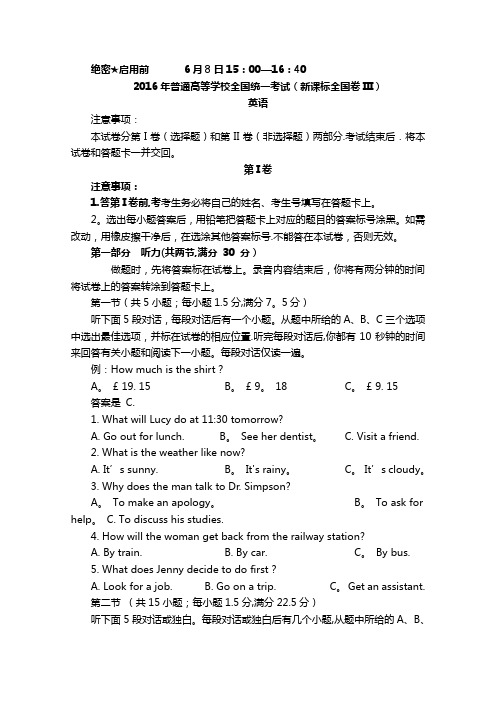
绝密★启用前6月8日15:00—16:402016年普通高等学校全国统一考试(新课标全国卷III)英语注意事项:本试卷分第I卷(选择题)和第II卷(非选择题)两部分.考试结束后.将本试卷和答题卡一并交回。
第I卷注意事项:1.答第I卷前,考考生务必将自己的姓名、考生号填写在答题卡上。
2。
选出每小题答案后,用铅笔把答题卡上对应的题目的答案标号涂黑。
如需改动,用橡皮擦干净后,在选涂其他答案标号.不能答在本试卷,否则无效。
第一部分听力(共两节,满分30 分)做题时,先将答案标在试卷上。
录音内容结束后,你将有两分钟的时间将试卷上的答案转涂到答题卡上。
第一节(共5小题;每小题1.5分,满分7。
5分)听下面5段对话,每段对话后有一个小题。
从题中所给的A、B、C三个选项中选出最佳选项,并标在试卷的相应位置.听完每段对话后,你都有10秒钟的时间来回答有关小题和阅读下一小题。
每段对话仅读一遍。
例:How much is the shirt?A。
£ 19. 15B。
£ 9。
18 C。
£ 9. 15答案是C.1. What will Lucy do at 11:30 tomorrow?A. Go out for lunch. B。
See her dentist。
C. Visit a friend.2. What is the weather like now?A. It’s sunny.B。
It's rainy。
C。
It’s cloudy。
3. Why does the man talk to Dr. Simpson?A。
To make an apology。
B。
To ask for help。
C. To discuss his studies.4. How will the woman get back from the railway station?A. By train.B. By car. C。
2016年普通高等学校招生全国统一考试英语试题(全国卷3,含答案)(完整资料).doc
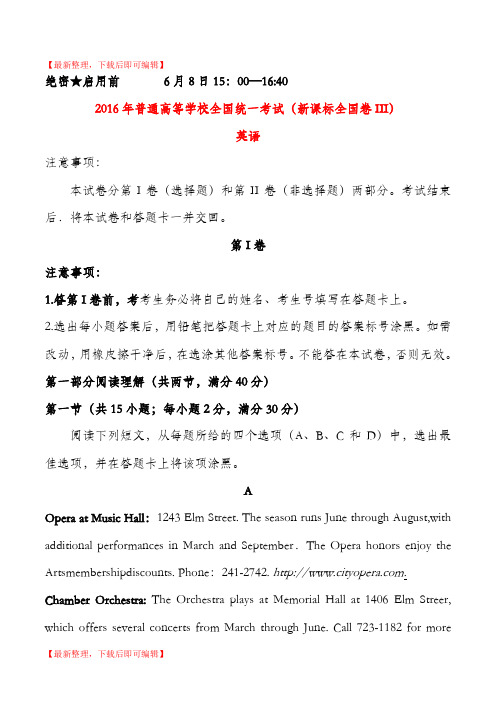
【最新整理,下载后即可编辑】绝密★启用前6月8日15:00—16:402016年普通高等学校全国统一考试(新课标全国卷III)英语注意事项:本试卷分第I卷(选择题)和第II卷(非选择题)两部分。
考试结束后.将本试卷和答题卡一并交回。
第I卷注意事项:1.答第I卷前,考考生务必将自己的姓名、考生号填写在答题卡上。
2.选出每小题答案后,用铅笔把答题卡上对应的题目的答案标号涂黑。
如需改动,用橡皮擦干净后,在选涂其他答案标号。
不能答在本试卷,否则无效。
第一部分阅读理解(共两节,满分40分)第一节(共15小题;每小题2分,满分30分)阅读下列短文,从每题所给的四个选项(A、B、C和D)中,选出最佳选项,并在答题卡上将该项涂黑。
AOpera at Music Hall:1243 Elm Street. The season runs June through August,with additional performances in March and September.The Opera honors enjoy the Artsmembershipdiscounts. Phone:241-2742. . Chamber Orchestra: The Orchestra plays at Memorial Hall at 1406 Elm Streer, which offers several concerts from March through June. Call 723-1182 for moreinformation. http:.SymphonyOrchestra: At Music Hall and Riverbend. For ticket sales, call 381-3300. Regular season runs September through May at Music Hall in summer at Riverbend. /home.asp.College Conservatory of Music (CCM):Performances are onthemain campus(校园)ofthe university, usually at Patricia Cobbett Theater. CCM organizes a variety of events, including performances by the well-known Lasalle Quartet, CCM’s Philharmonic Orchestra, andvatiousgroups of musicians presenting Baroque through modern music Students with I.D card can attend the events for free. A free schedule of events for each term is available by calling the box office at 556-4183. /events/calendar.Riverbend Music Theater: 6295 Kellogg Ave. Large outdoor theater with the closest seats under cover (piecedifference).Big name shows all summer long! Phone:232-6220. http:///.1·Whichnumber shouldyoucallifyouwantto see opera?A 241-2742.B 723-1182.C 381-3300D 232-62202.When canyougotoaconcert byChamber OrchestraA.February. B May. C August. D November.3.Wherecanstudent go for free preformances with their ID cards?A.MusicHall.B .Memorial Hall.C.Patricia Cobbett Theater.D.RiverbendMusicTheater4·H ow isRiverbend MusicTheaterdifferentfrom the other places?A.Ithas seatsintheopenair.B.Itgives shows allyear roundC.Itoffersmembership discounts.D.It presentsfamousmusicalworksBOn one of her trips to New York several years ago, Eudora Welty decided to take a couple of New York friends out to dinner. They settled in at a comfortable East Slide café and within minutes, another customer was approaching their table. “Hey, aren’t you from Mississippi?”the elegant, white-haired writer remembered being asked by the stranger. “I’m from Mississippi too.”Without a second thought, the woman joined the Welty party. When her dinner partner showed up, she also pulled up a chair.“They began telling me all the news ofMississippi,”Welty said. “I didn’t know what my New York friends were thinking.”Taxis on a rainy New York night are rarer than sunshine. By the time the group got up to leave, it was pouring outside. Welty’s new friends immediately sent a waiter to find a cab. Heading back downtown toward her hotel, her big-city friends were amazed at the turn of events that had changed their Big Apple dinner into a Mississippi“My friends said: ‘Now we believe your stories,’” Welty added. And I said: ‘Now you know. These are the people that make me write them.’”Sitting on a soda in her room, Welty, a slim figure in a simple gray dress, looked pleased with this explanation.“I don’t make them up,” she said of the characters in her fiction these last 50 or so years. “I don’t have to.”Beauticians, bartenders, piano players and people with purple hats, Welty’s people come from afternoons spent visiting with old friends, from walks through the streets of her native Jackson, Miss., from conversations overheard on a bus. It annoys Welty that, at 78, her left ear has now given out. Sometimes, sitting on a bus or a train, she hears only a fragment(片段) of a particularly interesting story. 5.What happened when Welty was with her friends at the cafe?A. Two strangersjoined her.B. Her childhood friends came inC. Aheavy rain ruined the dinner.D.Some people held apartythere.6 .The underlined word “them” in Paragraph 6 refers to Welty’s__A.readers B parties C.friendsD stories7. Whatcanwelearn aboutthecharactersinWelty’s fiction?A. Theylivein bigcitiesB.TheyaremostlywomenC. Theycomefrom reallifeD.Theyare pleasure seekersCIf you are a fruit grower —or would like to become one —take advantage of Apple Day to see what’s around. It’s called Apple Day but in practice it’s more like Apple Month. The day itself is on October 21, but since it has caught on, events now spread out over most of October around Britain.Visiting an apple event is a good chance to see, and often taste, a wide variety of apples. To people who are used to the limited choice of apples such as Golden Delicious and Royal Gala in supermarkets, it can be quite an eye opener to see the range of classical apples still in existence, such as Decio which was grown by the Romans. Although it doesn’t taste of anything special, it’s still worth a try, as is the knobbly(多疙瘩的) Cat’s Head which is more of a curiosity than anything else.There are also varieties developed to suit specific local conditions. One of the very best varieties for eating quality is Orleans Reinette, but you’ll need a warm, sheltered place with perfect soil to grow it, so it’s a pipe dream for most apple lovers who fall for it.At the events, you can meet expert growers and discuss which ones will best suit your conditions, and because these are family affairs, children are well catered for with apple-themed fun and games.Apple Days are being held at all sorts of places with an interest in fruit,including stately gardens and commercial orchards(果园).If you want to have a real orchard experience, try visiting the National Fruit Collection at Brogdale,near Faversham in Kent.8.What can people do attheapple events?A .Attend experts’lectures.B .Visit fruit-loving families.C .Plantfruit trees inan orchard.D. Tastemanykinds ofapples.9.What can welearnaboutDecio?A.Itisanew variety.B.It has a strangelook.C. Itisrarely seen now.D.Ithas a specialtaste.10. Whatdoesthe un derlined phrase““a pipe dream””in Paragraph 3mean?A.Apracticalidea.B. A vain hope.C.A brilliant plan.D. A selfish desire.11.Whatisthe author’s p urpose inwritingthe text?A.To showhowto grow apples.B .Tointroduce an applefestival.C.Tohelppeople selectapples.D. Topromoteapple research.DBad news sells. If it bleeds, it leads. No news is good news, and good news is no news. Those are the classic rules for the evening broadcasts and the morningpapers. But now that information is being spread and monitored(监控) in different ways, researchers are discov ering new rules. By tracking people’s e-mails and online posts, scientists have found that good news can spread faster and farther than disasters and sob stories.“The ‘if it bleeds’ rule works for mass media,” says Jonah Berger, a scholar at the Univer sity of Pennsylvania. “They want your eyeballs and don’t care how you’re feeling. But when you share a story with your friends, you care a lot more how they react. You don’t want them to think o f you as a Debbie Downer.”Researchers analyzing word-of-mouth communication—e-mails,Web posts and reviews, face-to-face conversations—found that it tended to be more positive than negative(消极的), but that didn’t necessarily mean people preferred positive news. Was positive news shared more often simply because people experienced more good things than bad things? To test for that possibility, Dr. Berger looked at how people spread a particular set of news stories: thousands of articles on The New York Times’ website. He and a Penn colleague analyzed the “most e-mai led” list for six months. One of his first finds was that articles in the science section were much more likely to make the list than non-science articles. He found that science amazed Times’ readers and made them want to share this positive feeling with others.Readers also tended to share articles that were exciting or funny, or thatinspired negative feelings like anger or anxiety, but not articles that left them merely sad. They needed to be aroused(激发) one way or the other, and they preferred good news to bad. The more positive an article, the more likely it was to be shared, as Dr. Berger explains in his new book, “Contagious: Why Things Catch On.”12 .Whatdothe classic rulesmentionedinthetext apply to?A.News reports.B. Research papers.C .Private e-malls.D.Daily conversations.13. What canweinferaboutpeople like DebbieDowner?A.They’re sociallyinactive.B.They’re good at telling stories.C. They’re inconsiderate ofothers.D. They’re carefulwiththeirwords.14.Whichtendedtobethemost e-mailed accordingtoDr.Berger’s research?A .Sports new.B .Science articles.C.Personal accounts.D. Financial reviews.15 .What canbea suitable title forthetext?A.SadStoriesTravel FarWide.B .OnlineNewsAttractsMorePeople.C.ReadingHabitsChange withthe Times.D.GoodNewsBeatsBadon SocialNetworks.第二节(共5小题;每小题2分,满分10分)根据短文内容,从短文后的选项中选出能填入空白处的最佳选项。
2016年高考全国3卷英语试题及参考答案解析
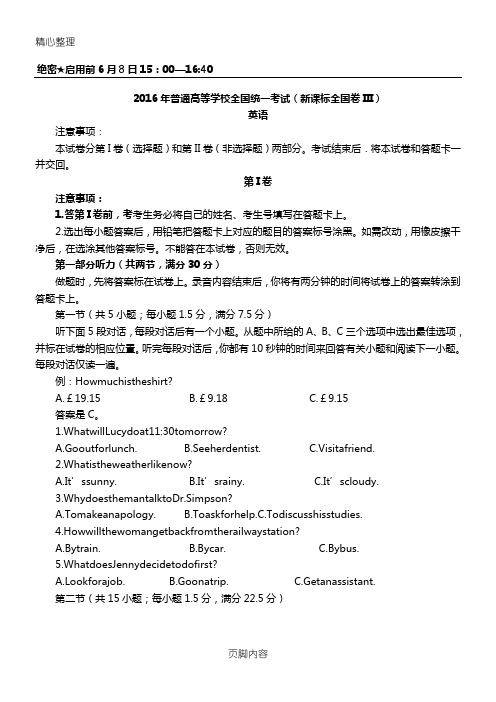
绝密★启用前6月8日15:00—16:402016年普通高等学校全国统一考试(新课标全国卷III)英语注意事项:本试卷分第I卷(选择题)和第II卷(非选择题)两部分。
考试结束后.将本试卷和答题卡一并交回。
第I卷注意事项:1.答第I卷前,考2.第一部分听力(共两节,满分30分)做题时,先将答案标在试卷上。
答题卡上。
第一节(共5小题;每小题1.5分,满分听下面5段对话,每段对话后有一个小题。
例:A.£ C.£9.15答案是C.Visitafriend.C.It’scloudy.A.Tomakeanapology.B.Toaskforhelp.C.Todiscusshisstudies.4.Howwillthewomangetbackfromtherailwaystation?A.Bytrain.B.Bycar.C.Bybus.5.WhatdoesJennydecidetodofirst?A.Lookforajob.B.Goonatrip.C.Getanassistant.第二节(共15小题;每小题1.5分,满分22.5分)听下面5段对话或独白。
每段对话或独白后有几个小题,从题中所给的A、B、C三个选项中选出最佳选项,并标在试卷的相应位置。
听每段对话或独白前,你将有时间阅读各个小题,每小题5秒钟;听完后,各小题将给出5秒钟的作答时间。
每段对话或独白读两遍。
听第6段材料,回答第6、7题。
6.Whattimeisitnow?A.1:45.B.2:10.C.2:15.7.Whatwillthemando?A.Workonaproject.B.SeeLindainthelibrary.C.MeetwithProfessorSmith.听第7段材料,回答第8至10题。
8.Whatarethespeakerstalkingabout?AHavinggueststhisweekend.B.Goingoutforsightseeing.C.Movingintoanewhouse.听第8C.InKansas.C.Reading.C.Nature.听第9A.Toattendatrainingprogram.B.Tocarryoutsomeresearch.C.Totakeavacation.15.HowlongwillDorothystayinEurope?A.Afewdays.B.Twoweeks.C.Threemonths.16.WhatdoesDorothythinkofherapartment?A.It’sexpensive.B.It’ssatisfactory.C.It'sinconvenient.17WhatdoesBilloffertodoforDorothy?A.RecommendherapartmenttoJim.B.Findanewapartmentforher.C.Takecareofherapartment.听第10段材料,回答第18至20题。
2016年高考全国3卷英语试题及答案解析

绝密★启用前6月8日15:00—16:402016年普通高等学校全国统一考试(新课标全国卷III)英语注意事项:本试卷分第I卷(选择题)和第II卷(非选择题)两部分。
考试结束后.将本试卷和答题卡一并交回。
第I卷注意事项:1。
答第I卷前,考考生务必将自己的姓名、考生号填写在答题卡上.2。
选出每小题答案后,用铅笔把答题卡上对应的题目的答案标号涂黑。
如需改动,用橡皮擦干净后,在选涂其他答案标号。
不能答在本试卷,否则无效。
第一部分听力(共两节,满分30 分)做题时,先将答案标在试卷上。
录音内容结束后,你将有两分钟的时间将试卷上的答案转涂到答题卡上.第一节(共5小题;每小题1。
5分,满分7。
5分)听下面5段对话,每段对话后有一个小题。
从题中所给的A、B、C三个选项中选出最佳选项,并标在试卷的相应位置。
听完每段对话后,你都有10秒钟的时间来回答有关小题和阅读下一小题。
每段对话仅读一遍.例:How much is the shirt?A。
£ 19. 15B。
£ 9. 18 C. £ 9。
15答案是C。
1. What will Lucy do at 11:30 tomorrow?A。
Go out for lunch。
B. See her dentist. C. Visit a friend。
2. What is the weather like now?A。
It’s sunny。
B. It’s rainy.C。
It’s cloudy。
3。
Why does the man talk to Dr. Simpson?A. To make an apology。
B. To ask for help.C. To discuss his studies。
4。
How will the woman get back from the railway station?A。
By train。
B. By car。
2016年高考全国3卷英语试题及答案解析

绝密★启用前6月8日15:00—16:402016年普通高等学校全国统一考试(新课标全国卷III)英语注意事项:本试卷分第I卷(选择题)和第II卷(非选择题)两部分。
考试结束后.将本试卷和答题卡一并交回。
第I卷注意事项:1.答第I卷前,考考生务必将自己的姓名、考生号填写在答题卡上.2。
选出每小题答案后,用铅笔把答题卡上对应的题目的答案标号涂黑.如需改动,用橡皮擦干净后,在选涂其他答案标号.不能答在本试卷,否则无效.第一部分听力(共两节,满分30 分)做题时,先将答案标在试卷上。
录音内容结束后,你将有两分钟的时间将试卷上的答案转涂到答题卡上。
第一节(共5小题;每小题1。
5分,满分7。
5分)听下面5段对话,每段对话后有一个小题。
从题中所给的A、B、C三个选项中选出最佳选项,并标在试卷的相应位置。
听完每段对话后,你都有10秒钟的时间来回答有关小题和阅读下一小题。
每段对话仅读一遍。
例:How much is the shirt?A。
£ 19。
15 B. £ 9。
18 C。
£ 9. 15答案是C.1. What will Lucy do at 11:30 tomorrow?A. Go out for lunch。
B. See her dentist。
C. Visit a friend.2. What is the weather like now?A. It’s sunny。
B. It’s rainy.C。
It’s cloudy.3. Why does the man talk to Dr. Simpson?A。
To make an apology. B. To ask for help。
C. To discuss his studies。
4。
How will the woman get back from the railway station?A。
By train。
B. By car. C. By bus。
2016年英语高考试题全国卷3(含答案)(精校版)
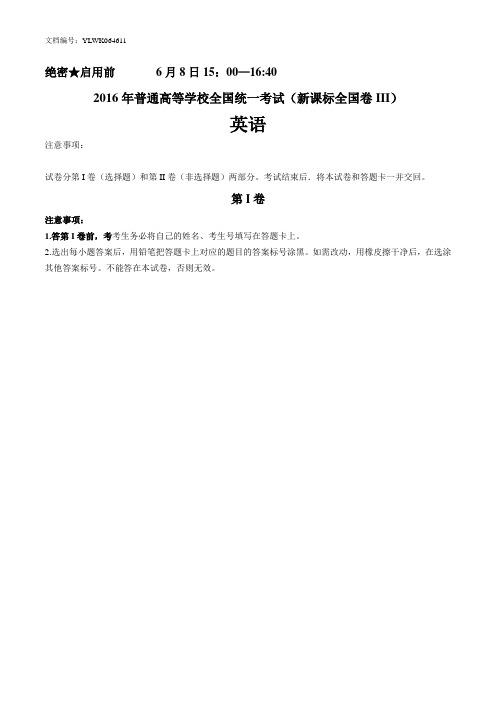
绝密★启用前6月8日15:00—16:402016年普通高等学校全国统一考试(新课标全国卷III)英语注意事项:试卷分第I卷(选择题)和第II卷(非选择题)两部分。
考试结束后.将本试卷和答题卡一并交回。
第I卷注意事项:1.答第I卷前,考考生务必将自己的姓名、考生号填写在答题卡上。
2.选出每小题答案后,用铅笔把答题卡上对应的题目的答案标号涂黑。
如需改动,用橡皮擦干净后,在选涂其他答案标号。
不能答在本试卷,否则无效。
读下列短文,从每题所给的四个选项(A、B、C和D)中,选出最佳选项,并在答题卡上将该项涂黑。
AMusicOpera at Music Hall: 1243 Elm Street. The season runs June through August, with additional performances in March and September. The Opera honors Enjoy the Arts membership discounts. Phone: 241-2742. .Chamber Orchestra: The Orchestra plays at Memorial Hall at 1406 Elm Street, which offers several concerts from March through June. Call 723-1182 for more information. .Symphony Orchestra: At Music Hall and Riverbend. For ticket sales, call 381-3300. Regular season runs September through May at Music Hall in summer at Riverbend. /home.asp.College Conservatory of Music (CCM): Performances are on the main campus(校园) of the university, usually at Patricia Cobbett Theater. CCM organizes a variety of events, including performances by the well-known LaSalle Quartet, CCM’s Philharmonic Orchestra, and various groups of musicians presenting Baroque through modern music. Students with I.D. cards can attend the events for free. A free schedule of events for each term is available by calling the box office at 556-4183. /events/calendar.Riverbend Music Theater: 6295 Kellogg Ave. Large outdoor theater with the closest seats under cover (pricedifference).Big name shows all summer long! Phone:232-6220. .1. Which number should you call if you want to see an opera?A. 241-2742.B. 723-1182.C. 381-3300.D. 232-6220.2. When can you go to a concert by Chamber Orchestra?. February. B. May. C. August. D. November.3.Where can students go for free performances with their I.D. cards?. Music Hall. B. Memorial Hall.. Patricia Cobbett Theater. D. Riverbend Music Theater.4. How is Riverbend Music Theater different from the other places?. It has seats in the open air.. It gives shows all year round.. It offers membership discounts.. It presents famous musical works.BOn one of her trips to New York several years ago, Eudora Welty decided to take a couple of New York friends out to dinner. They settled in at a comfortable East Side cafe and within minutes, another customer was approaching their table.“Hey, aren’t you from Mississippi?” the elegant, white-haired writer remembered being asked by the stranger. “I’m from Mississippi too.”Without a second thought, the woman joined the Welty party. When her dinner partner showed up, she also pulled up a chair.“They began telling me all the news of Mississippi,” Welty said. “I didn’t know what my New York friends were thinking.”Taxis on a rainy New York night are rarer than sunshine. By the time the group got up to leave, it was pouring outsi de. Welty’s new friends immediately sent a waiter to find a cab. Heading back downtown toward her hotel, her big-city friends were amazed at the turn of events that had changed their Big Apple dinner into a Mississippi.“My friends said: ‘Now we believe your stories,’” Welty added. “And I said: ‘Now you know. These are the people that make me write them.’”Sitting on a sofa in her room, Welty, a slim figure in a simple gray dress, looked pleased with this explanation.“I don’t make them up,” she said of the characters in her fiction these last 50 or so years. “I don’t have to.”Beauticians, bartenders, piano players and people with purple hats, Welty’s people come from afternoons spent visiting with old friends, from walks through the streets of her native Jackson, Miss., from conversations overheard on a bus. It annoys Welty that, at 78, her left ear has now given out. Sometimes, sitting on a bus or a train, she hears only a fragment(片段) of a particularly interesting story.5. What happened when Welty was with her friends at the cafe?. Two strangers joined her.. Her childhood friends came in.C. A heavy rain ruined the dinner.. Some people held a party there.6. The underlined word “them” in Paragraph 6 refers to Welty’s.. readers B. parties C. friends D. stories7. What can we learn about the characters in Welty’s fiction?A. They live in big cities.B. They are mostly women.C. They come from real life.D. They are pleasure seekers.Cf you are a fruit grower—or would like to become one—take advantage of Apple Day to see what’s around. It’s called Apple Day but in practice it’s more like Apple Month. The day itself is on October 21, but since it has caught on, events now spread out over most of October around Britain.isiting an apple event is a good chance to see, and often taste, a wide variety of apples. To people who are used to the limited choice of apples such as Golden Delicious and Royal Gala in supermarkets, it can be quite an eye opener to see the range of classical apples still in existence, such as Decio which was grown by the Romans. Although it doesn’t taste of anything special, it’s still worth a try, as is the knobbly(多疙瘩的) Cat’s Head which is more of a curiosity than anything else.here are also varieties developed to suit specific local conditions. One of the very best varieties for eating quality is Orleans Reinette, but you’ll need a warm, sheltered place with perfect soil to grow it, so it’s a pipe dream for mostapple lovers who fall for it.At the events, you can meet expert growers and discuss which ones will best suit your conditions, and because these are family affairs, children are well catered for with apple-themed fun and games.pple Days are being held at all sorts of places with an interest in fruit, including stately gardens and commercial orchards(果园).If you want to have a real orchard experience, try visiting the National Fruit Collection at Brogdale, near Faversham in Kent.8.What can people do at the apple events?A. Attend experts’ l ectures.B. Visit fruit-loving families.C. Plant fruit trees in an orchard.D. Taste many kinds of apples.9.What can we learn about Decio?. It is a new variety. B. It has a strange look.C. It is rarely seen now.D. It has a special taste.10. What does the underlined phrase “a pipe dream” in Paragraph 3mean?A. A practical idea.B. A vain hope..A brilliant plan. D. A selfish desire.11.What is the author’s purpose in writing the text?. To show how to grow apples..To introduce an apple festival.. To help people select apples.. To promote apple research.Dad news sells. If it bleeds, it leads. No news is good news, and good news is no news. Those are the classic rules for the evening broadcasts and the morning papers. But now that information is being spread and monitored(监控) in different ways, researchers are discovering new rules. By tracking people’s e-mails and online posts, scientists have found that good news can spread faster and farther than disasters and sob stories.“The ‘if it bleeds’ rule works for mass media,” says Jonah Berger, a scholar at the University of Pennsylvania. “They want your eyeballs and don’t care how you’re feeling. But when you share a story with your friends, you care a lot more how they react. You don’t want them to think of you as a Debbie Downer.”Researchers analyzing word-of-mouth communication—e-mails, Web posts and reviews, face-to-face conversations—found that it tended to be more positive than negative(消极的), but that didn’t necessarily mean people preferred positive news. Was positive news shared more often simply because people experienced more good things than bad things? To test for that possibility, Dr. Berger looked at how people spread a particular set of news stories: thousands of articles on The New York Times’ website. He and a Penn colleague analyzed the “most e-mailed” list for six months. One of his first findings was that articles in the science section were much more likely to make the list than non-science articles. He found that science amazed Times’ readers and made them want to share this positive feeling with others.Readers also tended to share articles that were exciting or funny, or that inspired negative feelings like anger or anxiety, but not articles that left them merely sad. They needed to be aroused(激发) one way or the other, and they preferred good news to bad. The more positive an article, the more likely it was to be shared, as Dr. Berger explains in his new book, “Contagious: Why Things Catch On.”12 .What do the classic rules mentioned in the text apply to?. News reports. B. Research papers..Private e-mails. D. Daily conversations.13. What can we infer about people like Debbie Downer?. They’re socially inactive.. They’re good at telling stories.. They’re inconsiderate of others.. They’re careful with their words.14.Which tended to be the most e-mailed according to Dr. Berger’s research?. Sports new. B. Science articles.. Personal accounts. D. Financial reviews.15 .What can be a suitable title for the text?. Sad Stories Travel Far and Wide.Online News Attracts More People. Reading Habits Change with the Times. Good News Beats Bad on Social Networks第二节(共5小题;每小题2分,满分10分)据短文内容,从短文后的选项中选出能填入空白处的最佳选项。
(精校版)2016年全国卷III高考英语试题(含答案)

绝密★启封前2016普通高等学校招生全国统一考试(新课标I)英语试卷类型A第Ⅰ卷第一部分听力(共两节,满分30 分)做题时,现将答案标在试卷上,录音内容结束后,你将有两分钟的时间将试卷上的答案转涂到答题卡上。
第一节(共5小题;每小题1.5分,满分7.5分)听下面5段对话,每段对话后有一个小题。
从题中所给的A、B、C三个选项中选出最佳选项,并标在试卷的相应位置。
听完每段对话后,你都有10秒钟的时间来回答有关小题和阅读下一小题。
每段对话仅读一遍。
例:How much is the shirt?A. £ 19. 15B. £ 9. 18C. £ 9. 15答案是C。
1. What are the speakers talking about?A. Having a birthday party.B. Doing some exercise.C. Getting Lydia a gift.2. What is the woman going to do?A. Help the man.B. Take a bus.C. Get a camera.3. What does the woman suggest the man do?A. Tell Kate to stop.B. Call Kate, s friends.C. Stay away from Kate.4. Where does the conversation probably take place?A. In a wine shop.B. In a supermarket.C. In a restaurant.5. What does the woman mean?A. Keep the window closed.B. Go out for fresh air.C. Turn on the fan.听第6段材料,回答第6、7题。
2016年英语高考试题全国卷3(含答案)
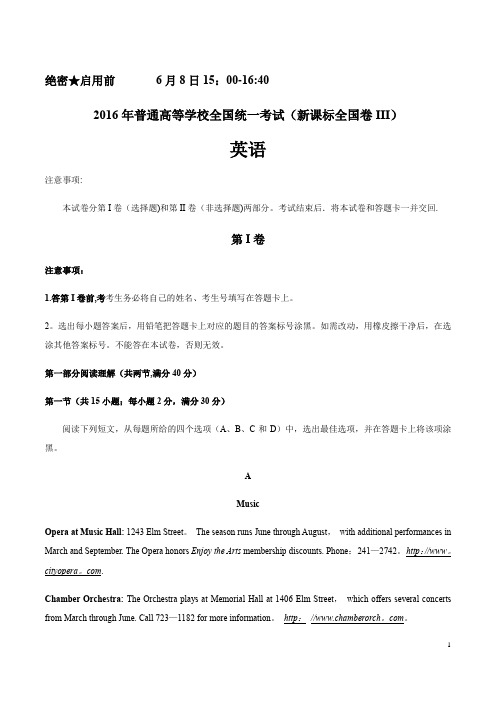
绝密★启用前6月8日15:00-16:402016年普通高等学校全国统一考试(新课标全国卷III)英语注意事项:本试卷分第I卷(选择题)和第II卷(非选择题)两部分。
考试结束后.将本试卷和答题卡一并交回.第I卷注意事项:1.答第I卷前,考考生务必将自己的姓名、考生号填写在答题卡上。
2。
选出每小题答案后,用铅笔把答题卡上对应的题目的答案标号涂黑。
如需改动,用橡皮擦干净后,在选涂其他答案标号。
不能答在本试卷,否则无效。
第一部分阅读理解(共两节,满分40分)第一节(共15小题;每小题2分,满分30分)阅读下列短文,从每题所给的四个选项(A、B、C和D)中,选出最佳选项,并在答题卡上将该项涂黑。
AMusicOpera at Music Hall: 1243 Elm Street。
The season runs June through August,with additional performances in March and September. The Opera honors Enjoy the Arts membership discounts. Phone:241—2742。
http://www。
cityopera。
com.Chamber Orchestra: The Orchestra plays at Memorial Hall at 1406 Elm Street,which offers several concerts from March through June. Call 723—1182 for more information。
http://www.chamberorch。
com。
Symphony Orchestra:At Music Hall and Riverbend。
For ticket sales, call 381-3300. Regular season runs September through May at Music Hall in summer at Riverbend。
2016年英语高考新课标III卷(完美版,含答案)
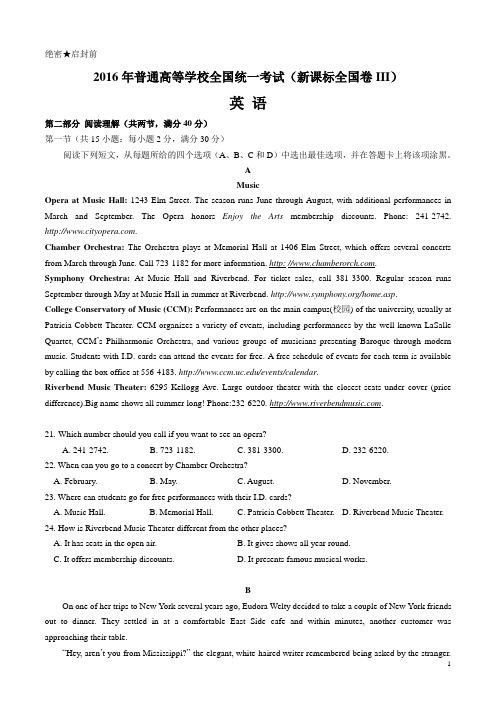
绝密★启封前2016年普通高等学校全国统一考试(新课标全国卷III)英语第二部分阅读理解(共两节,满分40分)第一节(共15小题:每小题2分,满分30分)阅读下列短文,从每题所给的四个选项(A、B、C和D)中选出最佳选项,并在答题卡上将该项涂黑。
AMusicOpera at Music Hall: 1243 Elm Street. The season runs June through August, with additional performances in March and September. The Opera honors Enjoy the Arts membership discounts. Phone: 241-2742. .Chamber Orchestra: The Orchestra plays at Memorial Hall at 1406 Elm Street, which offers several concerts from March through June. Call 723-1182 for more information. .Symphony Orchestra: At Music Hall and Riverbend. For ticket sales, call 381-3300. Regular season runs September through May at Music Hall in summer at Riverbend. /home.asp.College Conservatory of Music (CCM): Performances are on the main campus(校园) of the university, usually at Patricia Cobbett Theater. CCM organizes a variety of events, including performances by the well-known LaSalle Quartet, CCM’s Philharmonic Orchestra, and various groups of musicians presenting Baroque through modern music. Students with I.D. cards can attend the events for free. A free schedule of events for each term is available by calling the box office at 556-4183. /events/calendar.Riverbend Music Theater: 6295 Kellogg Ave. Large outdoor theater with the closest seats under cover (price difference).Big name shows all summer long! Phone:232-6220. .21.Which number should you call if you want to see an opera?A. 241-2742.B. 723-1182.C. 381-3300.D. 232-6220.22. When can you go to a concert by Chamber Orchestra?A. February.B. May.C. August.D. November.23. Where can students go for free performances with their I.D. cards?A. Music Hall.B. Memorial Hall.C. Patricia Cobbett Theater.D. Riverbend Music Theater.24. How is Riverbend Music Theater different from the other places?A. It has seats in the open air.B. It gives shows all year round.C. It offers membership discounts.D. It presents famous musical works.BOn one of her trips to New York several years ago, Eudora Welty decided to take a couple of New York friends out to dinner. They settled in at a comfortable East Side cafe and within minutes, another customer was approaching their table.“Hey, aren’t you from Mississippi?” the elegant, white-haired writer remembered being asked by the stranger.“I’m from Mississippi too.”Without a second thought, the woman joined the Welty party. When her dinner partner showed up, she also pulled up a chair.“They began telling me all the news of Mississippi,” Welty said. “I didn’t know what my New York friends were thinking.”Taxis on a rainy New York night are rarer than sunshine. By the time the group got up to leave, it was pouring outside. Welty’s new friends immediately sent a waiter to find a cab. Heading back downtown toward her hotel, her big-city friends were amazed at the turn of events that had changed their Big Apple dinner into a Mississippi.“My friends said: ‘Now we believe your stories,’” Welty added. “And I said: ‘Now you know. These are the people that make me write them.’”Sitting on a sofa in her room, Welty, a slim figure in a simple gray dress, looked pleased with this explanation.“I don’t make them up,” she said of the characters in her fiction these last 50 or so years. “I don’t have to.”Beauticians, bartenders, piano players and people with purple hats, Welty’s people come from afternoons spent visiting with old friends, from walks through the streets of her native Jackson, Miss., from conversations overheard on a bus. It annoys Welty that, at 78, her left ear has now given out. Sometimes, sitting on a bus or a train, she hears only a fragment(片段) of a particularly interesting story.25. What happened when Welty was with her friends at the cafe?A. Two strangers joined her.B. Her childhood friends came in.C. A heavy rain ruined the dinner.D. Some people held a party there.26. The underlined word “them” in Paragraph 6 refers to Welty’s .A. readersB. partiesC. friendsD. stories27. What can we learn about the characters in Welty’s fiction?A. They live in big cities.B. They are mostly women.C. They come from real life.D. They are pleasure seekers.CIf you are a fruit grower—or would like to become one—take advantage of Apple Day to see what’s around. It’s called Apple Day but in practice it’s more like Apple Month. The day itself is on October 21, but since it has caught on, events now spread out over most of October around Britain.Visiting an apple event is a good chance to see, and often taste, a wide variety of apples. To people who are used to the limited choice of apples such as Golden Delicious and Royal Gala in supermarkets, it can be quite an eye opener to see the range of classical apples still in existence, such as Decio which was grown by the Romans. Although it doesn’t taste of anything special, it’s still worth a try, as is the knobbly(多疙瘩的) Cat’s Head which is more of a curiosity than anything else.There are also varieties developed to suit specific local conditions. One of the very best varieties for eating quality is Orleans Reinette, but you’ll need a warm, sheltered place with perfect soil to grow it, so it’s a pipe dream for most apple lovers who fall for it.At the events, you can meet expert growers and discuss which ones will best suit your conditions, and becausethese are family affairs, children are well catered for with apple-themed fun and games.Apple Days are being held at all sorts of places with an interest in fruit, including stately gardens and commercial orchards(果园).If you want to have a real orchard experience, try visiting the National Fruit Collection at Brogdale, near Faversham in Kent.28. What can people do at the apple events?A. Attend experts’ lectures.B. Visit fruit-loving families.C. Plant fruit trees in an orchard.D. Taste many kinds of apples.29. What can we learn about Decio?A. It is a new variety.B. It has a strange look.C. It is rarely seen now.D. It has a special taste.30. What does the underlined phrase “a pipe dream” in Paragraph 3mean?A. A practical idea.B. A vain hope.C.A brilliant plan.D. A selfish desire.31. What is the aut hor’s p urpose in writing the text?A. To show how to grow apples. B .To introduce an apple festival.C. To help people select apples.D. To promote apple research.DBad news sells. If it bleeds, it leads. No news is good news, and good news is no news. Those are the classic rules for the evening broadcasts and the morning papers. But now that information is being spread and monitored(监控) in different ways, researchers are discovering new rules. By tracking people’s e-mails and online posts, scientists have found that good news can spread faster and farther than disasters and sob stories.“The ‘if it bleeds’ rule works for mass media,” says Jonah Berger, a scholar at the University of Pennsylvania. “They want your eyeballs and don’t care how you’re fe eling. But when you share a story with your friends, you care a lot more how they react. You don’t want them to think of you as a Debbie Downer.”Researchers analyzing word-of-mouth communication—e-mails, Web posts and reviews, face-to-face conversations—found that it tended to be more positive than negative(消极的), but that didn’t necessarily mean people preferred positive news. Was positive news shared more often simply because people experienced more good things than bad things? To test for that possibility, Dr. Berger looked at how people spread a particular set of news stories: thousands of articles on The New York Times’ website. He and a Penn colleague analyzed the “most e-mailed” list for six months. One of his first find ings was that articles in the science section were much more likely to make the list than non-science articles. He found that science amazed Times’ readers and made them want to share this positive feeling with others.Readers also tended to share articles that were exciting or funny, or that inspired negative feelings like anger or anxiety, but not articles that left them merely sad. They needed to be aroused(激发) one way or the other, and they preferred good news to bad. The more positive an article, the more likely it was to be shared, as Dr. Berger explains in his new book, “Contagious: Why Things Catch On.”32 .What do the classic rules mentioned in the text apply to?A. News reports.B. Research papers.C. Private e-mails.D. Daily conversations.33. What can we infer about people like Debbie Downer?A. They’re socially inactive.B. They’re good at telling stories.C. They’re inconsiderate of others.D. They’re careful with their words.34.Which tended to be the most e-mailed according to Dr. Berger’s research?A . Sports new. B. Science articles.C. Personal accounts.D. Financial reviews.35. What can be a suitable title for the text?A. Sad Stories Travel Far and Wide B .Online News Attracts More PeopleC. Reading Habits Change with the TimesD. Good News Beats Bad on Social Networks第二节(共5小题,每小题2分,满分10分)根据短文内容,从短文后的选项中选出能填入空白处的最佳选项,选项中有两项为多余选项。
- 1、下载文档前请自行甄别文档内容的完整性,平台不提供额外的编辑、内容补充、找答案等附加服务。
- 2、"仅部分预览"的文档,不可在线预览部分如存在完整性等问题,可反馈申请退款(可完整预览的文档不适用该条件!)。
- 3、如文档侵犯您的权益,请联系客服反馈,我们会尽快为您处理(人工客服工作时间:9:00-18:30)。
2016·全国卷Ⅲ(英语)第Ⅰ卷第一部分阅读理解(共两节,满分40分)第一节(共15小题;每小题2分,满分30分)阅读下列短文,从每题所给的四个选项(A、B、C和D)中,选出最佳选项。
C4[2016·全国卷Ⅲ]AMusicOpera at Music Hall: 1243 Elm Street. The season runs June through August, with additional performances in March and September. The Opera honours Enjoy the Arts membership discounts. Phone: 241-2742. http://.Chamber Orchestra: The Orchestra plays at Memorial Hall at 1406 Elm Street, which offers several concerts from March through June. Call 723-1182 for more information. http:__//.Symphony Orchestra: At Music Hall and Riverbend. For ticket sales, call 381-3300. Regular season runs September through May at Music Hall and in summer at Riverbend. http:///home.asp.College Conservatory of Music (CCM): Performances are on the main campus(校园) of the university, usually at Patricia Cobbett Theatre. CCM organizes a variety of events, including performances by the well-known LaSalle Quartet, CCM's Philharmonic Orchestra, and various groups of musicians presenting Baroque through modern music. Students with I.D. cards can attend the events for free. A free schedule of events for each term is available by calling the box office at 556-4183. http:///events/calendar.Riverbend Music Theatre: 6295 Kellogg Ave. Large outdoor theatre with the closest seats under cover (price difference). Big name shows all summer long! Phone:232-6220. http://www.ri .1. Which number should you call if you want to see an opera?A. 241-2742.B. 723-1182.C. 381-3300.D. 232-6220.2. When can you go to a concert by Chamber Orchestra?A. February.B. May.C. August.D. November.3. Where can students go for free performances with their I.D. cards?A. Music Hall.B. Memorial Hall.C. Patricia Cobbett Theatre.D. Riverbend Music Theatre.4. How is Riverbend Music Theatre different from the other places?A. It has seats in the open air.B. It gives shows all year round.C. It offers membership discounts.D. It presents famous musical works.【要点综述】这是一篇应用文。
本文通过广告的形式介绍了几家举行音乐演出的剧场的信息。
1.A细节理解题。
根据第一则广告Opera at Music Hall中“Phone:241-2742.”可知,要想看歌剧应拨打电话241-2742。
2.B细节理解题。
根据第二则广告中的“…which offers several concerts from March through June.”可知,5月份期间可以去听该音乐会。
3.C细节理解题。
根据第四则广告的“Performances are on the main campus(校园) of the university…Students with I.D. cards can attend the events for free.”可知,学生凭身份证可以免费在Patricia Cobbett Theatre看演出。
4.A细节理解题。
根据题干Riverbend Music Theatre可知信息在最后一则广告中。
再根据“Large outdoor theatre with the closest seats under cover (price difference).”可知是露天剧场,其他几家剧场没有室外席位,因此“露天席位”是其特色。
选项中的seats in the open air 是outdoor theatre的同义替换。
C2[2016·全国卷Ⅲ]BOn one of her trips to New York several years ago, Eudora Welty decided to take a couple ofNew York friends out to dinner. They settled in at a comfortable East Side cafe and within minutes, another customer was approaching their table.“Hey, aren't you from Mississippi?”the elegant, white-haired writer remembered being asked by the stranger. “I'm from Mississippi too.”Without a second thought, the woman joined the Welty party. When her dinner partner showed up, she also pulled up a chair.“They began telling me all the news of Mississippi,”Welty said. “I didn't know what my New York friends were thinking.”Taxis on a rainy New York night are rarer than sunshine. By the time the group got up to leave,it was pouring outside. Welty's new friends immediately sent a waiter to find a cab. Heading back downtown toward her hotel, her big-city friends were amazed at the turn of events that had changed their Big Apple dinner into a Mississippi state reunion(团聚).“My friend said: ‘Now we believe your stories,’” Welty added. “And I said: ‘Nowyou know. These are the people that make me write them.’”Sitting on a sofa in her room, Welty, a slim figure in a simple gray dress, looked pleased withthis explanation.“I don't make them up,”she said of the characters in her fiction these last 50 or so years. “I don't have to.”Beauticians, bartenders, piano players and people with purple hats, Welty's people come fromafternoons spent visiting with old friends, from walks through the streets of her native Jackson,Miss, from conversations overheard on a bus. It annoys Welty that, at 78, her left ear has now givenout. Sometimes, sitting on a bus or a train, she hears only a fragment(片断) of a particularlyinteresting story.5. What happened when Welty was with her friends at the cafe?A. Two strangers joined her.B. Her childhood friends came in.C. A heavy rain ruined the dinner.D. Some people held a party there.________.6. Th e underlined word “them” in Paragraph 6 refers to Welty'sA. readersB. partiesC. friendsD. stories7. What can we learn about the characters in Welty's fiction?A. They live in big cities.B. They are mostly women.C. They come from real life.D. They are pleasure seekers.【要点综述】这是一篇记叙文。
